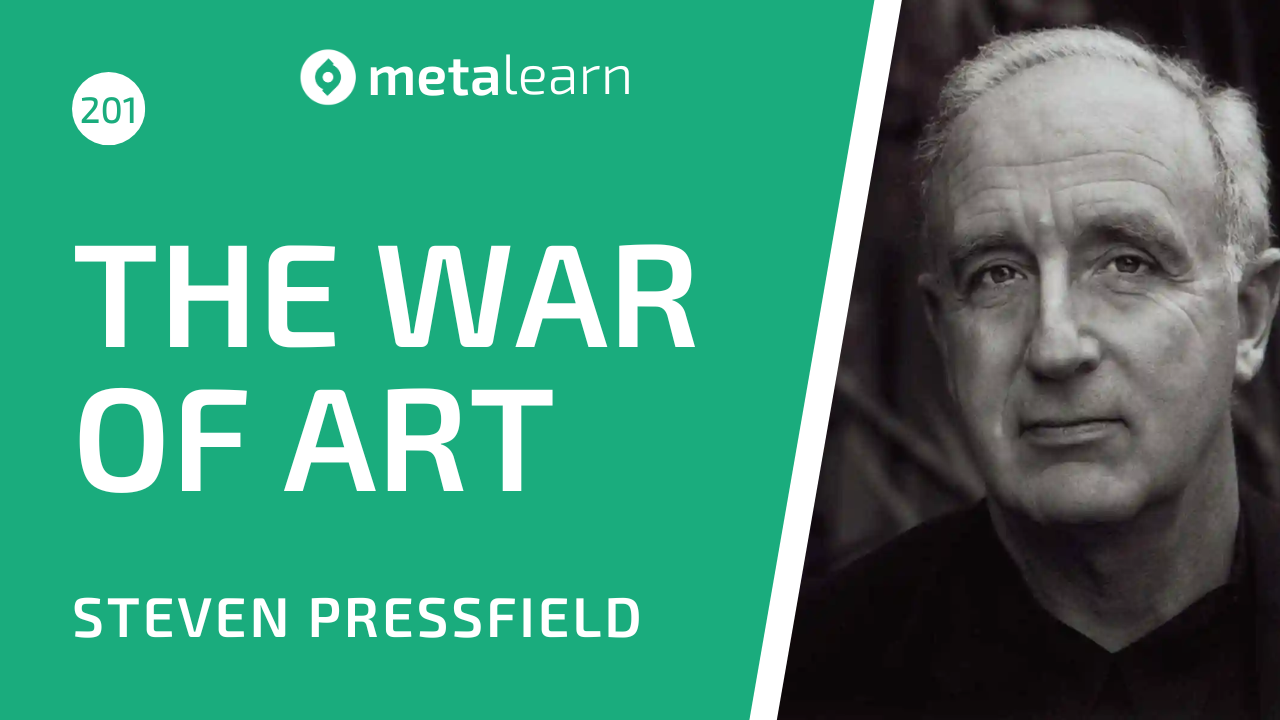ML201: Steven Pressfield on Overcoming Resistance, The War of Art & Finding Your Creative Voice

Steven Pressfield is a bestselling author of historical fiction and non-fiction, including The War of Art, Gates of Fire, and The Legend of Bagger Vance.
His path to literary success was anything but conventional: he worked 21 different jobs in eleven states - from truck driver to fruit picker to oil rig worker - and wrote for 27 years before getting his first novel published at age 52.
His book The War of Art has become essential reading for artists and entrepreneurs battling what he calls "resistance" the internal force that keeps us from doing our most important work.
His historical novels are taught at military academies and have influenced everyone from Marines to CEOs.
In this conversation, we explore:
- Steve's philosophy about creative work and the process of writing his own biography, Government Cheese
- How shame and honour drive the creative life, and why both emotions are essential for artists
- The ancient concept of the "daimon" (inner guiding spirit) and how it shapes our creative destiny
This is a deep dive into the artist's journey with someone who made it through decades of struggle to find his voice.
SHOW NOTES
- What was writing personal biography "Government Cheese" like for Steven and what does he hope readers will gain from his creative struggles? [01:00]
- Is fiction actually closer to truth than nonfiction? Steve reveals his personal philosophy on storytelling. [02:32]
- What makes specific details so powerful in both fiction and memoir, and how do they create the "illusion of truth"? [03:53]
- What is the importance of a name? How did a title Steve initially hated become the perfect metaphor for his entire story? [04:58]
- What's Steve's method for knowing when creative work is truly finished, and how does he avoid the trap of endless revision? [07:33]
- What was Steve's greatest challenge as a writer, and what crucial advice did his agent give him about perfectionism? [09:05]
- What was going on when Nasos completed a major creative project but couldn't bring himself to publish it? [11:01]
- What simple solution does Steve offer for overcoming creative resistance around publishing your work? [13:58]
- How did getting published at 52 shape affect Steve's approach to daily discipline and creative urgency? [15:08]
- What's the difference between finding your calling and finding your voice, and what does it mean for "playtime" to end in the creative life? [15:59]
- What is the metaphor Steve uses to describe the creative process, and how does it illustrate the role of ego? [17:53]
- How does praise from readers and fans affect Steve, and who is he really writing for? [22:59]
- How did someone from a business oriented family stumble into creative work? [24:48]
- What is Steve's "dandruff test" for identifying writers, and why does he trust the unkempt ones more than the ones who are put together? [26:42]
- Do creative partnerships happen through networking or something else entirely? Steve shares his experience. [29:35]
- Why is Steve actually grateful that Hollywood never made "Gates of Fire" into a movie? [30:55]
- What brutal reality of the Hollywood system made Steve stop thinking in screenplays altogether? [32:14]
- How can shame actually drive creative work, and what's its connection to honour? [35:10]
- What was it about the self-discipline that Steve noticed in his friend that impressed him so much and how did it affect his own daily routine? [38:28]
- How does a creative forge true self-discipline when external structures disappear? [41:36]
- What is the "daimon" and why is Steve so fascinated by this ancient concept of our inner guiding spirit? [44:12]
- Why should we look at life backwards rather than forwards, and what does this reveal about destiny? [47:57]
- How did Steve's spiritual beliefs emerge from his writing practice, and where does he think creativity actually comes from? [54:09]
- Why does Steve defend writing about cultures other than your own in creative work, and who tells better stories, insiders or outsiders? [51:23]
- Why does Steve never discuss his work-in-progress with anyone, and what his the danger of doing this? [59:43]
- Are artists fundamentally alone, and what are they really connected to if not other people? [57:35]
RESOURCES
Follow Steven online
Twitter/X | Personal Website
- Government Cheese: A Memoir by Steven Pressfield
- A Man at Arms by Steven Pressfield
- The War of Art by Steven Pressfield
- The Artist's Journey by Steven Pressfield
- Gates of Fire by Steven Pressfield
- The Soul's Code by James Hillman
- The Legend of Bagger Vance (Film)

